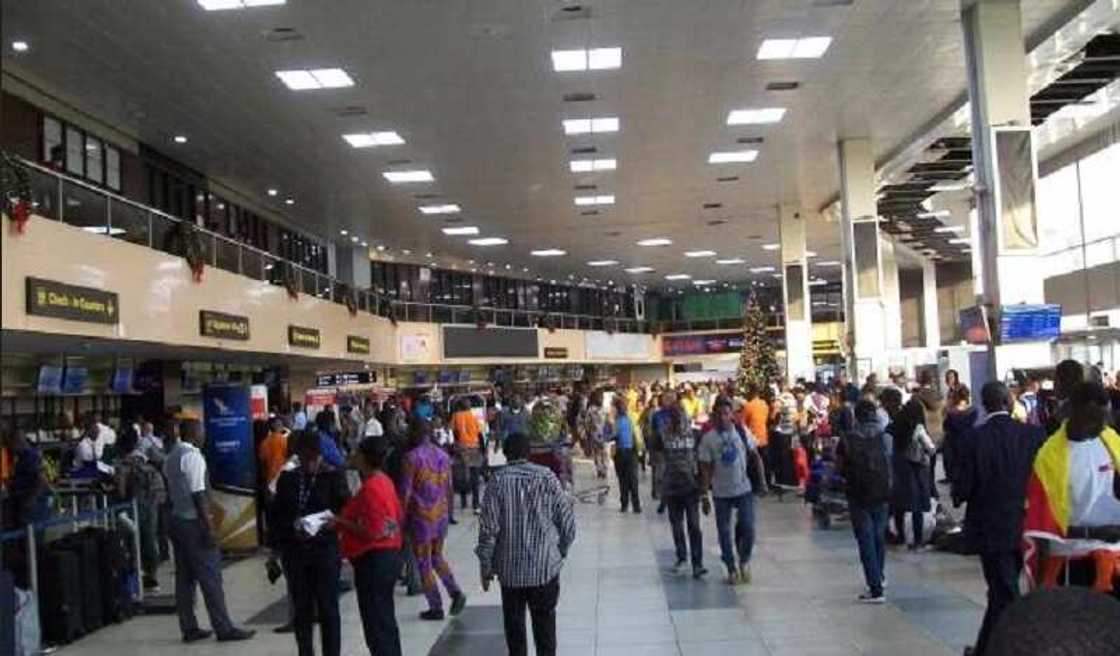The ‘Japa’ Syndrome and How it is Affecting Nigeria’s Economy
- The 'Japa' trend has seen Nigeria lose a lot of skilled workers to the labour markets of the United Kingdom, the United States, Canada, the Netherlands and Australia
- The emigration of qualified professionals has a far more damaging impact on Nigeria and sectors of the economy on a large scale
- Many who are today caught up in the 'Japa' syndrome say they have lost hope in Nigeria and believe the country practically has no promises for them
PAY ATTENTION: Сheck out news that is picked exactly for YOU ➡️ click on “Recommended for you” and enjoy!
Recently, a video emerged on Nigeria’s social media showing a large number of people at the airport with their bags and luggage trying to board several flights departing the country. At first look, the trending clip seemed like something to have a good laugh about, but on a second or third look, it suddenly dawns on one that we indeed have a crisis on our hands.

Read also
2023: Peter Obi Breathes Fire, Sends Strong Message to FG Over Lingering Fuel Scarcity, Naira Notes Shortage
In the last one year, or thereabout, the Yoruba word ‘Japa’ has become a popular trending adjective on Nigeria's social media. Now widely adopted when referring to one migrating from Nigeria to another part of the world, the 'Japa' syndrome has seen Nigerians leaving their once beloved country in droves.

Source: Twitter
Recent studies have shown that a key driver of the exodus of Nigerians to Europe and America is the need to escape the harsh economic condition in the country. These conditions include worsening security situation, rising unemployment, high cost of living, and bad governance and leadership, amongst others.
PAY ATTENTION: Share your outstanding story with our editors! Please reach us through info@corp.legit.ng!
Nigeria's inflation rate for August 2022 rose to 20.52%. With an estimated 40million Nigerians without jobs, the unemployment rate stands at 33.3% as last recorded in the last quarter of 2020.
Many who are today caught up in the 'Japa' syndrome say they have lost hope in Nigeria and believe the country practically has no promises for them. While many have chosen the education and employment route to 'Japa', others chose more extremely dangerous expeditions, either crossing the deserts of northern Africa or attempting perilous trips through the Mediterranean Sea.
The belief, therefore, is that immigrating to other parts of the world would afford them better education, better career opportunities, better-paying jobs, and of course, a safer and more secure future for their children. These benefits, they believe are quite elusive in Nigeria at the moment.
Whatever the so-called benefits may be, the truth is that the emigration of qualified professionals has a far more damaging impact on Nigeria and sectors of the economy on a large scale.
Loss of talents
The 'Japa' trend has seen Nigeria lose a lot of skilled workers to the labour markets of the United Kingdom, the United States, Canada, the Netherlands and Australia. Many professionals, especially medical practitioners, bankers, academics and techies are leaving the shores of the country for greener pastures abroad.
A report by the Government of the United Kingdom revealed that approval to Nigerian nationals for its Worker Visas increased by 11, 854 between December 2019 to June 2022.
According to the report, this is a 303% level change from 3,918 in December 2019 to 15,772 in June 2022, making Nigerians the second-highest recipients.
The enormous richness of Nigeria’s human resources is evident in the fact that Western countries are welcoming large numbers of Nigerians as skilled workers
Skill gaps in organisations
There’s no doubt that the current 'Japa' trend is leaving a huge skill gap in most organizations. As earlier mentioned in the previous point above, great talents have continued to emigrate from the country as companies are losing a lot of their best hands who take with them years of training and skills to foreign countries.
This leaves a gap in many organisations which subsequently has to be filled by newer talents that may not necessarily be as experienced as those who have left these organisations. In other words, organisations have to repeatedly invest in the retraining of staff.
Crippled industry growth
Emigration has stunted the growth of some key industries in Nigeria. Imagine a health sector where the best doctors have emigrated, a tech sector where the best techies are expressing their talents in Europe and America, and an academic system where the best academics have taken their knowledge abroad. Imagine this scenario for every other sector of the economy.
The African Union stated in its Revised Policy Framework for Africa and Plan of Action (2018-2027) that an estimated 70,000 skilled professionals emigrate from Africa each year. According to reports, Nigeria lost over 9000 medical doctors to the United Kingdom, Canada, and the U.S.A between 2016-2018. With a depleting number of medical doctors, Nigeria annually spends between $1.2 billion and $1.6 billion on medical tourism.
Loss of tax and funds to other nations
The Chairman of the Nigeria Diaspora Commission (NIDCOM), Abike Dabiri-Erewa had estimated that there are about 15 million Nigerians in the diaspora. If we assume that half of the number are of employment age and are currently working, that would mean Nigeria is losing potential tax payments by 7.5 million people who could have contributed to its economy.
There is also the matter of huge amounts of money spent on visa fees and International English Language Testing System (IELTS) exams conducted by the British Council by Nigerians looking to exit the country in exchange for foreign education.
According to the Central Bank of Nigeria, Nigerians spent at least $220.86 million on foreign education between December 2021 and February 2022. Another report showed that Nigerians spent a sum of $11.6 billion (N5 trillion) on foreign education between 2019 and 2022.
All these monies lost to other nations could have had positive impacts if spent in Nigeria.
High dollar demand, depreciating Naira
Due to a surge in the number of Nigerians who need dollars for travel, the United States’ currency has become scarce, thereby forcing it to exchange for as much as N700 for a dollar in the parallel market.
Rising dollar demand has put tremendous pressure on the naira and unfortunately, none of the policies introduced by the CBN to save the Naira from a continuous fall seems to be working.
The alarming exchange rate between the naira and the dollar has caused a rise in almost every imported commodity in Nigeria.
The optics of Japa trend
That being said, we cannot underestimate the positive side of the 'Japa' syndrome which is in diaspora remittance inflow. Between January and June of 2022, Nigerians received $10.11 as diaspora remittances, according to Nairametrics.
Nigeria’s diaspora remittance in a way gives the CBN the firepower to meet the pent-up demand for foreign exchange and defend the Naira against volatility. Remittances from the diaspora play an important role in the lives of recipients and are one of the most important sources of external flows of capital and forex for developing countries.
Source: Legit.ng






